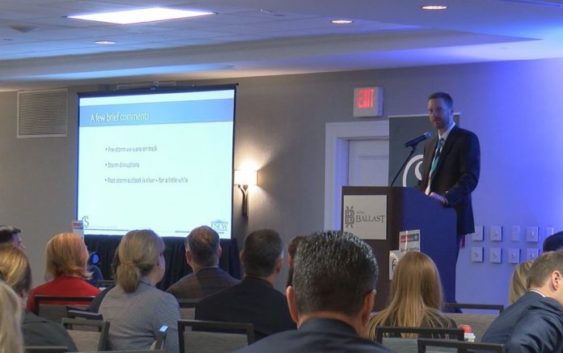- Charlotte-based marketing agency announces $20,000 Creative Campaign Grant to help communities after Hurricane Helene
- Artists transform hurricane aftermath into hoop-inspired masterpieces at Charlotte exhibit
- NC's cost for Hurricane Helene damage is nearly $60 billion, state says
- State to develop drone program to better respond to disasters like Helene, Florence
- South Carolina residents face deadline to get storm debris out to the curb after Hurricane Helene
Outlook Conference discusses Florence’s impact on Wilmington economy

WILMINGTON, NC (WWAY) — Hurricane Florence will impact Wilmington’s economy, but not for long, according to experts at the Outlook Economic Conference in Wilmington this morning.
Community leaders listened to several presentations on the local and national economies right now based on Hurricane Florence and the mid-term elections.
Regional Economist Adam Jones from UNCW’s Swain Center said Wilmington’s economy was doing very well before the storm. He said there is no doubt Florence will impact the economy, but not for long.
Adams said the unemployment rate will be affected, but should bounce back quickly for most areas, except one. He said the leisure and hospitality industry does not usually recover as fast as some others. He also said construction jobs should actually increase based on data from other areas in the country hit by storms.
Adams said if you look at some of the areas hit by other storms like Houston, New Orleans and Atlantic Beach, they almost always bounce back fairly quickly.
Adams also talked about some of the housing market impacts.
“We expect home prices to continue to increase next year and think that they will increase a little bit faster due to a shorter of homes from the hurricane as many were damaged, but as the damaged homes come back online, we should return to a more normal growth rate of say 4 or 5 or 6 percent a year,” Adams said.
Speaking about the area overall, Adams said the regional economy is going to grow a little bit slower next year than it has in the previous years.
“But that is normal as we reach full employment and it’s harder to find good workers and qualified workers,” Adams said.